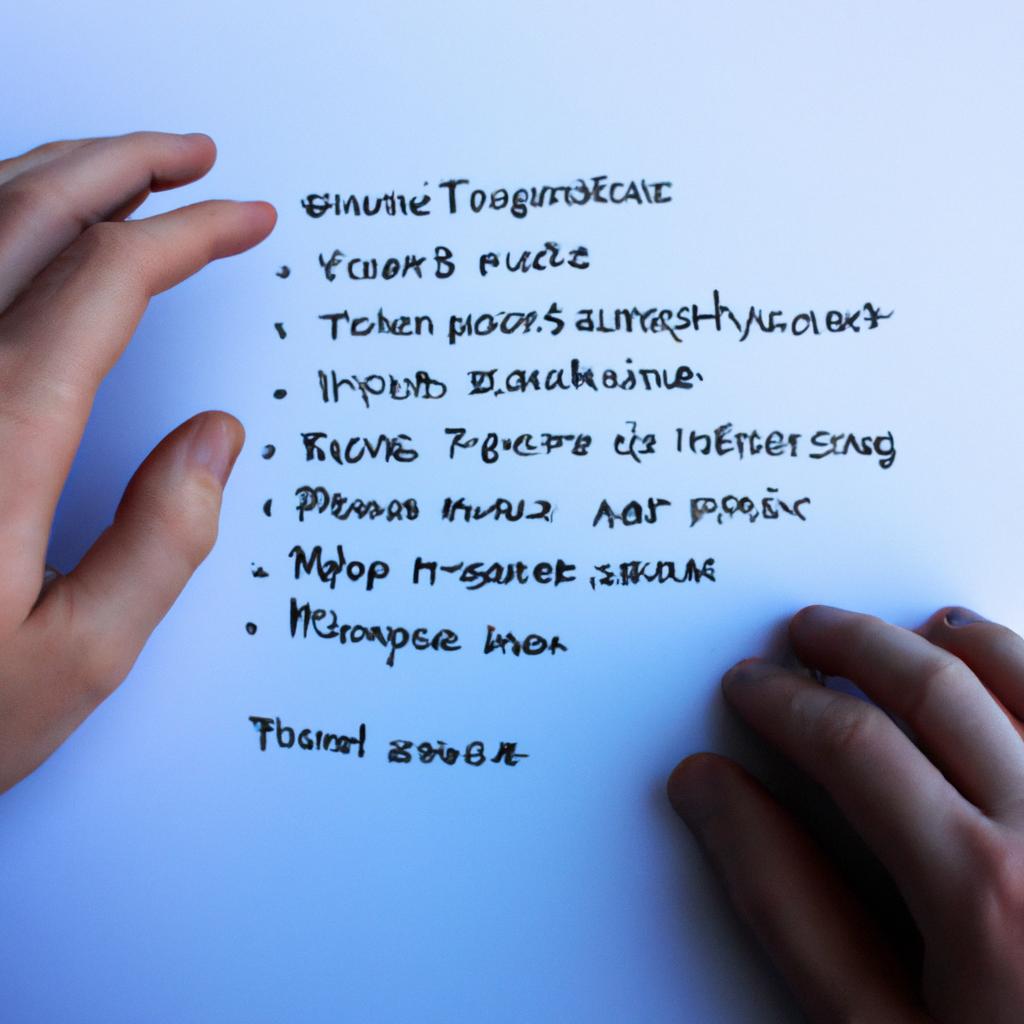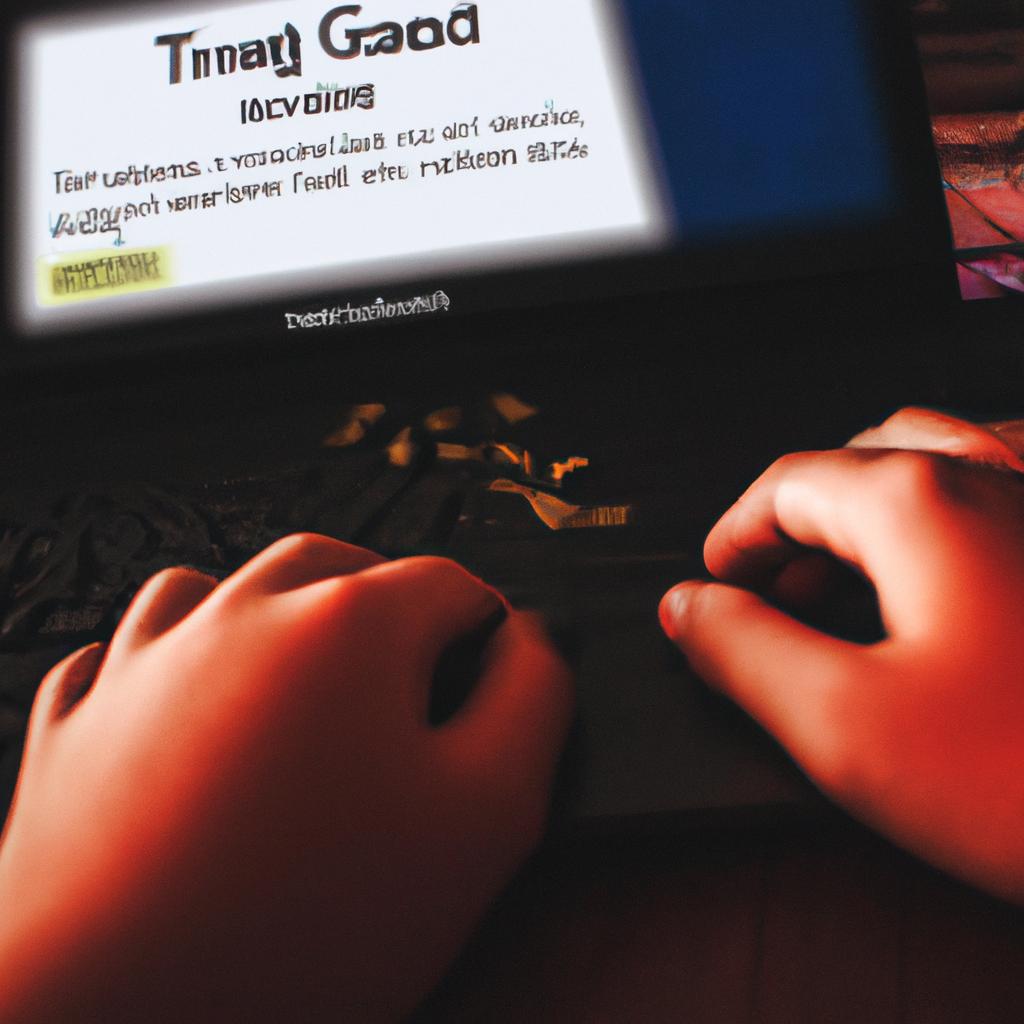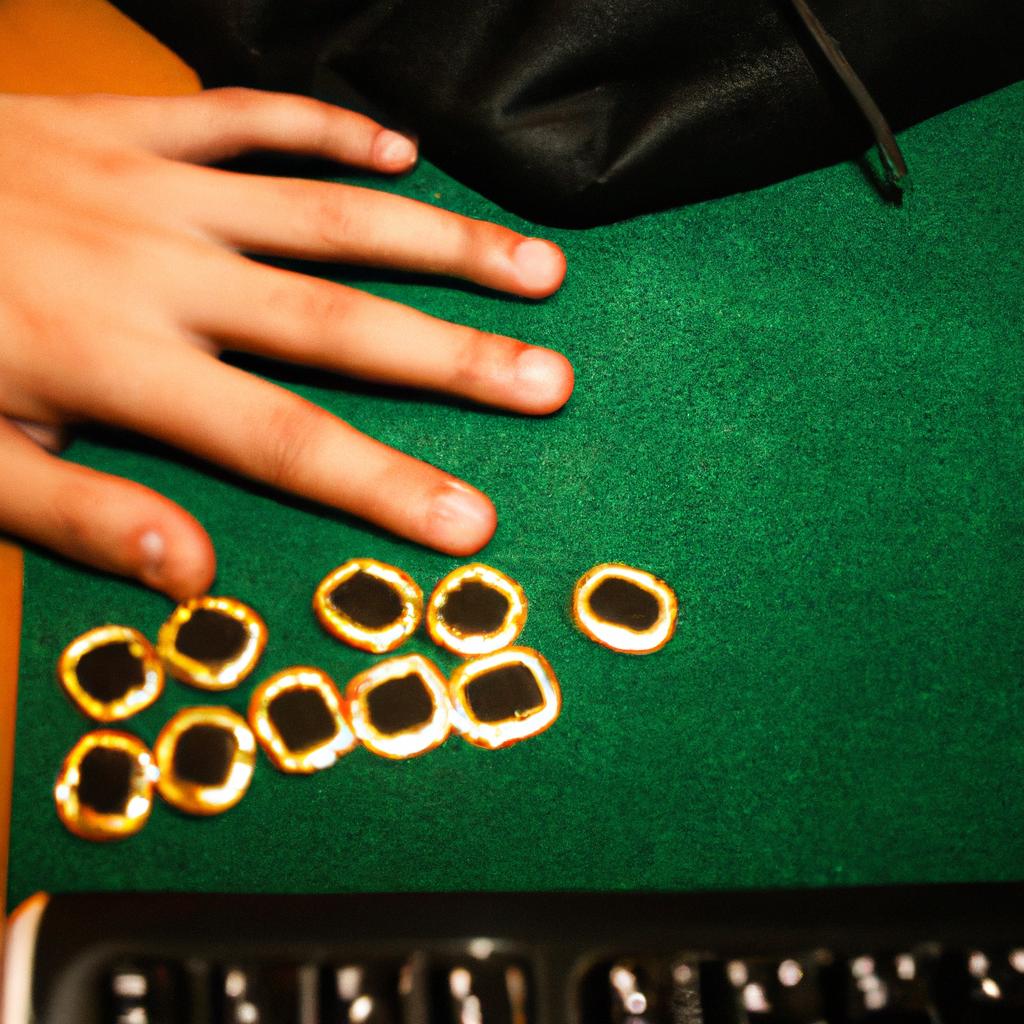In the online gaming world, player-to-player trading has become an integral and fascinating aspect of gameplay. One game that exemplifies this phenomenon is Runescape, an immersive multiplayer online role-playing game (MMORPG) developed by Jagex. The ability for players to trade in-game currency, known as gold, with one another has created a dynamic virtual economy within the game. This article aims to delve into the mechanics of player-to-player trading in Runescape, exploring its intricacies and shedding light on how this unique system operates.
To illustrate the significance of player-to-player trading in Runescape, let us consider a hypothetical scenario: Imagine two players – John and Sarah – each possessing different resources and skills within the game. John specializes in combat-related activities while Sarah excels in crafting rare items. In order to advance their respective goals efficiently, both players recognize the need to engage in trade with one another. John can offer his surplus weaponry to Sarah who requires such tools for her crafts, while Sarah can provide John with valuable potions or enchantments that enhance his combat prowess. Thus, through player-to-player trading, these individuals are able to mutually benefit from their distinct strengths and ensure optimal progression within the game’s vast virtual universe.
Player-to-player trading holds Player-to-player trading holds immense value in Runescape as it fosters a sense of community and collaboration among players. It allows individuals to specialize in different aspects of the game and rely on one another’s skills and resources to achieve their goals. This trading system also promotes social interaction, negotiation, and bartering between players, creating an engaging and dynamic gameplay experience. Additionally, player-to-player trading contributes to the virtual economy of the game by establishing supply and demand dynamics for various items, thereby adding depth and complexity to the overall gameplay environment.
What is player-to-player trading?
Imagine this scenario: you have been playing the popular online game Runescape for weeks, tirelessly completing quests and defeating formidable foes to accumulate a substantial amount of in-game currency known as gold. However, you find yourself lacking certain items or resources that are crucial for your character’s progression. This is where player-to-player trading comes into play.
In Runescape, player-to-player trading refers to the act of exchanging goods, services, or gold between individual players within the game’s virtual marketplace. It allows players to engage in mutually beneficial transactions by offering their surplus items in exchange for something they require. For instance, if a player possesses an abundance of rare potions but requires stronger armor, they can initiate a trade with another player who possesses the desired armor piece.
To better understand the mechanics behind player-to-player trading in Runescape, let us delve into its key aspects:
-
Voluntary Exchange: Player-to-player trading operates on the principle of voluntary exchange. Each party involved enters into a trade agreement willingly and without coercion. This ensures that both parties have consented and stand to benefit from the transaction.
-
Negotiation and Bargaining: Trading involves negotiation and bargaining between players who seek to strike a favorable deal. Participants must communicate effectively and negotiate mutually agreeable terms before finalizing any trades. This fosters social interaction and creates opportunities for collaboration within the gaming community.
-
Marketplace Dynamics: The virtual marketplace in Runescape is characterized by supply and demand dynamics similar to real-world economies. Players’ willingness to pay varying amounts of gold or offer different items influences market prices and availability. Understanding these dynamics enables players to make informed decisions during trades while considering factors such as rarity, desirability, and current trends.
-
Risk Assessment: Engaging in player-to-player trading entails assessing potential risks associated with fraudulent activities or scams. Due diligence is crucial to ensure the legitimacy of a trade partner and safeguard against potential loss. Utilizing trusted trading platforms or establishing a reputation within the community can mitigate risks and enhance trust between traders.
Through player-to-player trading, Runescape cultivates an immersive and dynamic virtual economy that mirrors real-world market interactions. This system allows players to harness their in-game resources effectively, fostering collaboration and strategic decision-making within the gaming community.
Why is player-to-player trading important in Runescape? Let us explore this question further in the subsequent section.
Why is player-to-player trading important in Runescape?
Player-to-Player Trading: Runescape Game Gold Trading Mechanics Explained
In the world of online gaming, player-to-player trading refers to the exchange of virtual goods or in-game currency between players. This allows gamers to acquire items they need or desire, while also providing an opportunity for others to profit from their surplus possessions. One example of this can be seen in the popular MMORPG (Massively Multiplayer Online Role-Playing Game) known as Runescape.
Player-to-player trading plays a crucial role in enhancing the gameplay experience within Runescape. Here are some reasons why it holds such significance:
- Economic Stability: Player-driven economies contribute to fostering stability within the game’s ecosystem. As players engage in trade and set prices, supply and demand dynamics come into play, leading to market equilibrium.
- Resource Acquisition: Through trading, players can obtain rare or valuable items that may otherwise be difficult or time-consuming to acquire on their own. This enables them to progress more efficiently and enjoy a wider range of gameplay opportunities.
- Social Interaction: The act of trading itself promotes social interaction among players, creating bonds and facilitating community engagement within the game environment.
- Entrepreneurial Opportunities: For some players, engaging in player-to-player trading presents entrepreneurial possibilities by allowing them to amass wealth through shrewd buying and selling strategies.
| Pros | Cons |
|---|---|
| Facilitates resource acquisition | Potential for scams or fraud |
| Fosters economic stability | Can lead to inflation if not properly regulated |
| Encourages social interaction | May create an uneven playing field based on wealth disparities |
| Provides entrepreneurial opportunities | Some players may become overly focused on accumulating wealth |
[Transition sentence]
Now that we understand the importance of player-to-player trading in Runescape, let’s delve into the mechanics of how this system operates.
How does player-to-player trading work in Runescape?
Player-to-player trading is a fundamental aspect of the Runescape game, allowing players to exchange in-game currency and items with each other. This form of trading plays an important role in the gameplay experience by facilitating economic interactions among players. To illustrate its significance, let’s consider a hypothetical scenario where a player named Alex wants to acquire a rare weapon that another player, Sarah, possesses.
In order for Alex and Sarah to engage in player-to-player trading, they must first initiate a trade request. This can be done by right-clicking on the intended recipient’s character and selecting the “Trade” option. Once both parties have agreed to trade, a separate screen will appear displaying their inventories and offering options for exchanging items or gold. During this process, it is crucial for players to communicate effectively and negotiate fair terms to ensure a mutually beneficial outcome.
To better understand how player-to-player trading works in Runescape, here are some key mechanics:
- Trading Window: The trading interface provides two main sections divided into columns – one representing Alex’s inventory and the other showing Sarah’s possessions. Each item can be individually selected from these columns before being added to the respective offer section.
- Acceptance Confirmation: Both participants must review their offers carefully before confirming the trade. Upon agreement, they need to click the “Accept” button simultaneously to proceed with the transaction.
- Trade Restrictions: Some items may be restricted from being traded due to certain game limitations or specific restrictions imposed by developers. These restrictions are designed to maintain balance within the game economy and prevent unfair trades or exploits.
- Trust Factors: Player reputation plays an essential role in successful trades. Prior knowledge about trusted traders or using intermediary services can help mitigate potential risks associated with fraudulent transactions.
Through these mechanics, player-to-player trading promotes social interaction within Runescape while fostering an environment of collaboration and cooperation among players. It enables individuals like Alex and Sarah to forge meaningful relationships through mutual exchanges and shared experiences.
What are the benefits of player-to-player trading in Runescape?
Player-to-Player Trading Mechanics in Runescape
Now that we understand how player-to-player trading works in Runescape, let’s delve deeper into the intricacies of this system. To illustrate its mechanics, consider a hypothetical scenario where two players, Alex and Sarah, decide to engage in a trade. Alex has obtained a rare weapon while completing a challenging quest, and Sarah is willing to exchange it for a large quantity of gold coins.
-
Trade Interface: When players initiate a trade, they are presented with an interface that allows them to view each other’s inventories and propose items or currency for exchange. This interface ensures transparency as both parties can thoroughly inspect the items before finalizing the transaction.
-
Negotiation and Agreements: Before proceeding with the trade, players have the opportunity to negotiate terms and conditions. They can discuss quantities, values, or even add additional items to sweeten the deal. Once an agreement is reached, both parties confirm their acceptance within the trade interface.
-
Trust Mechanisms: As player-to-player trading involves risks associated with potential scams or frauds, Runescape incorporates several trust mechanisms to safeguard participants’ interests. For instance, trades above a certain value require both users to enter a unique code known as “PIN” (Personal Identification Number). This added layer of security helps prevent unauthorized access and ensures that only genuine trades take place.
To further emphasize the impact of player-to-player trading on the gaming community, consider these emotional responses:
- Excitement: The thrill of discovering rare items drives players to actively participate in trading activities.
- Satisfaction: Successful trades provide a sense of achievement and progress within the game.
- Trust: Building trustworthy relationships through fair trading enhances social interactions among players.
- Disappointment: Unsuccessful trades or instances of scamming can lead to frustration and mistrust within the community.
| Emotional Response | Example Scenario |
|---|---|
| Excitement | Alex finally obtains a coveted piece of armor after weeks of searching and decides to trade it for a substantial amount of gold coins. |
| Satisfaction | Sarah successfully trades her surplus crafting materials for a valuable pet, completing her collection and achieving an in-game goal. |
| Trust | Alex frequently engages in fair and honest transactions, gaining the trust of other players who actively seek him out as a reliable trading partner. |
| Disappointment | Sarah falls victim to a scam where another player promises her rare items but disappears once she makes the initial payment, leaving her empty-handed and demoralized. |
Understanding the mechanics and emotional impact of player-to-player trading sets the stage for exploring its risks and challenges in Runescape. By comprehending this aspect thoroughly, players can make informed decisions while engaging in these transactions to ensure their gaming experiences are positive and rewarding.
[Next section: What are the risks and challenges of player-to-player trading in Runescape?]
What are the risks and challenges of player-to-player trading in Runescape?
Player-to-Player Trading in Runescape: Risks and Challenges
While player-to-player trading in Runescape offers numerous benefits, it is not without its fair share of risks and challenges. Understanding these potential drawbacks can help players make informed decisions when engaging in this form of trade.
One notable risk of player-to-player trading is the possibility of encountering scammers or fraudsters. These individuals may attempt to deceive unsuspecting players by promising rare items or large quantities of gold but fail to deliver on their promises. For instance, imagine a scenario where a player agrees to trade their valuable weapon for a substantial amount of gold with another player. However, upon completing the transaction, they discover that the promised gold does not materialize, leaving them at a significant loss.
In addition to scams, there is also the inherent risk of facing untrustworthy traders who might exploit knowledge imbalances or manipulate prices to gain an unfair advantage. This can lead to situations where one party feels cheated or taken advantage of during the trade process. To mitigate these risks, it is essential for players to conduct thorough research about item values and market trends before engaging in any trades.
To further illustrate some common challenges faced by players engaged in player-to-player trading, consider the following bullet list:
- Time-consuming negotiations: Negotiating deals with other players can often be time-consuming as both parties try to reach a mutually beneficial agreement.
- Lack of transparency: Unlike official game markets or auction houses, player-to-player trading lacks transparency regarding pricing and availability.
- Limited security measures: While Jagex (the developer of Runescape) has implemented various security measures, such as trade limits and report systems, fraudulent activities still occur.
| Challenge | Description | Impact |
|---|---|---|
| Scams | Players may fall victim to scams resulting in losses | Financial setback |
| Trust issues | Doubts about the reliability and honesty of trading partners | Hinders trade progress |
| Time-consuming | Negotiating deals can be a time-intensive process | Delayed transactions |
| Lack of transparency | Uncertainty about fair pricing, availability, and market trends | Difficulty in making informed decisions |
In conclusion, player-to-player trading in Runescape presents its own set of risks and challenges that players should be aware of. Scammers, untrustworthy traders, time-consuming negotiations, lack of transparency, and limited security measures all contribute to the potential pitfalls. By understanding these challenges and taking appropriate precautions, players can better navigate the world of player-to-player trading.
Moving forward into the next section on “Tips for successful player-to-player trading in Runescape,” it is crucial to adopt certain strategies to mitigate these risks and maximize one’s chances for profitable trades.
Tips for successful player-to-player trading in Runescape
Having discussed the concept of player-to-player trading in Runescape, it is important to understand the various risks and challenges associated with this practice. These risks can significantly impact players’ experiences and outcomes when engaging in such transactions. To provide a clearer understanding, let’s consider an example scenario:
Example Scenario: Sarah, a dedicated player in Runescape, decides to engage in a high-value trade for rare items with another player named Alex. Both parties agree on the terms, but unfortunately, Alex fails to deliver the promised items after receiving payment from Sarah. This leaves her feeling frustrated and cheated.
-
Trustworthiness: Player-to-player trading heavily relies on trust between individuals. As demonstrated by Sarah’s unfortunate experience, there is always a risk that one party may deceive or scam the other. The lack of regulations and oversight makes it challenging to ensure fair trades consistently.
-
Market Volatility: The value of game currency or virtual items within Runescape fluctuates due to supply and demand dynamics driven by individual players’ actions. Consequently, traders must carefully monitor market trends to make informed decisions about when to buy or sell their assets.
-
Security Concerns: Engaging in player-to-player trading poses security concerns as scammers often attempt fraudulent activities such as phishing scams or hacking attempts targeting unsuspecting players who possess valuable goods or large amounts of game currency.
-
Lack of Legal Recourse: In most cases, disputes arising from player-to-player transactions cannot be resolved through legal means since these are essentially digital assets within a gaming environment rather than tangible goods subject to traditional laws and regulations.
To further illustrate the potential risks associated with player-to-player trading in Runescape, refer to the following table highlighting common challenges faced by participants:
| Challenge | Impact |
|---|---|
| Scamming | Financial loss, trust issues |
| Market manipulation | Economic imbalance |
| Account hacking | Loss of progress and assets |
| Lack of customer support | Difficulty resolving disputes |
In conclusion, player-to-player trading in Runescape presents significant risks and challenges that players must be aware of. Trustworthiness, market volatility, security concerns, and the lack of legal recourse are among the key factors that can impact individuals engaging in such transactions. By understanding these challenges, players can take necessary precautions to mitigate potential risks and ensure a more positive trading experience within the game environment.




